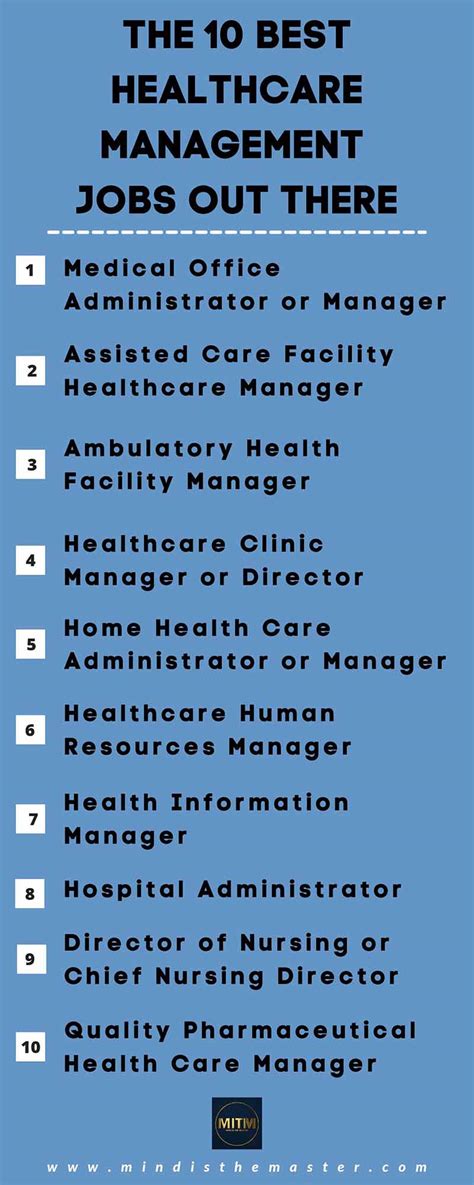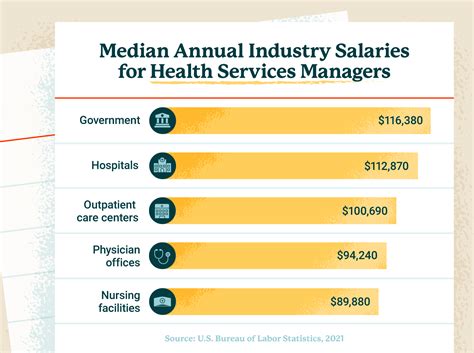Intro
The health care industry is one of the fastest-growing sectors in the world, driven by an aging population, advances in medical technology, and an increased focus on preventative care. As a result, health care management jobs are in high demand, offering a wide range of career opportunities for professionals with the right skills and training.
Health care management involves overseeing the delivery of health care services, including planning, organizing, and supervising the activities of health care providers, such as hospitals, clinics, and nursing homes. Health care managers must have a deep understanding of the health care system, including its complexities and challenges, as well as the skills to manage and lead teams, make strategic decisions, and navigate the ever-changing regulatory environment.

Types of Health Care Management Jobs
There are many different types of health care management jobs, each with its own unique responsibilities and requirements. Some of the most common health care management jobs include:
Clinical Manager
A clinical manager is responsible for overseeing the delivery of patient care services, including developing and implementing clinical policies and procedures, managing budgets, and supervising clinical staff.
Department Manager
A department manager is responsible for managing a specific department within a health care organization, such as radiology, laboratory, or pharmacy. Department managers must have a strong understanding of the department's operations and be able to manage budgets, staff, and resources.
Health Information Manager
A health information manager is responsible for managing the collection, analysis, and dissemination of health care data, including patient records, billing information, and clinical data.
Hospital Administrator
A hospital administrator is responsible for overseeing the overall operations of a hospital, including managing budgets, supervising staff, and ensuring compliance with regulatory requirements.
Nursing Home Administrator
A nursing home administrator is responsible for managing the day-to-day operations of a nursing home, including overseeing patient care, managing staff, and ensuring compliance with regulatory requirements.
Key Skills for Health Care Management Jobs
To be successful in a health care management job, professionals must possess a range of key skills, including:
Leadership and Management
Health care managers must be able to lead and manage teams, make strategic decisions, and communicate effectively with staff, patients, and other stakeholders.
Analytical and Problem-Solving
Health care managers must be able to analyze complex data, identify problems, and develop effective solutions.
Communication and Interpersonal
Health care managers must be able to communicate effectively with staff, patients, and other stakeholders, including physicians, nurses, and other health care professionals.
Financial Management
Health care managers must be able to manage budgets, develop financial plans, and make strategic financial decisions.
Regulatory Compliance
Health care managers must be able to ensure compliance with regulatory requirements, including HIPAA, OSHA, and other federal and state regulations.
Education and Training for Health Care Management Jobs
To pursue a career in health care management, professionals typically need to have a bachelor's degree in a related field, such as health care administration, business administration, or public health. Many health care managers also hold advanced degrees, such as a master's degree in health care administration (MHA) or a master's degree in business administration (MBA).
In addition to formal education, health care managers must also have relevant work experience, typically in a clinical or administrative role. Many health care managers also obtain certifications, such as the Certified Healthcare Administrator (CHA) or the Certified Professional in Healthcare Management (CPHM).
Career Outlook for Health Care Management Jobs
The career outlook for health care management jobs is strong, driven by the growing demand for health care services and the need for skilled professionals to manage and lead health care organizations.
According to the Bureau of Labor Statistics (BLS), employment of medical and health services managers is projected to grow 32% from 2020 to 2030, much faster than the average for all occupations.

Salary Ranges for Health Care Management Jobs
Salary ranges for health care management jobs vary widely, depending on factors such as location, industry, level of experience, and specific job title.
According to the BLS, the median annual salary for medical and health services managers was $119,840 in May 2020.
Here are some average salary ranges for common health care management jobs:
- Clinical Manager: $80,000 - $120,000 per year
- Department Manager: $70,000 - $110,000 per year
- Health Information Manager: $60,000 - $100,000 per year
- Hospital Administrator: $120,000 - $180,000 per year
- Nursing Home Administrator: $80,000 - $140,000 per year
Conclusion
Health care management jobs offer a wide range of career opportunities for professionals with the right skills and training. With the health care industry continuing to grow and evolve, the demand for skilled health care managers is expected to remain strong. Whether you're just starting your career or looking to advance, a career in health care management can be a rewarding and challenging profession.
What is health care management?
+Health care management involves overseeing the delivery of health care services, including planning, organizing, and supervising the activities of health care providers.
What are the key skills for health care management jobs?
+Key skills for health care management jobs include leadership and management, analytical and problem-solving, communication and interpersonal, financial management, and regulatory compliance.
What is the career outlook for health care management jobs?
+The career outlook for health care management jobs is strong, with employment of medical and health services managers projected to grow 32% from 2020 to 2030.

